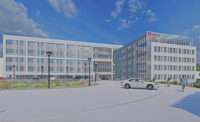Despite the ongoing construction slump, there is always demand for a more efficient and cost-effective building solution.
A Florida-based builder of concrete homes and other structures thinks it has such an innovation in its modular concrete building system that it is utilizing throughout South Florida and the Caribbean, including Haiti.
After some noteworthy recent successes in Palm Beach County, the Keys and pre-earthquake Haiti, officials with Royal Concrete Concepts of West Palm Beach are pitching their modular system as a building solution that can be shipped and constructed quickly almost anywhere.
�Our products combined with our new ocean shipping methods will help us rebuild cities worldwide,� says John W. Albert III, company vice president.
Southeast Successes While RCC executives may have their eyes on a global prize, the Florida builder has been achieving noteworthy local successes with its system for years.
RCC has delivered more than 5,000 residential and commercial applications in Florida. �We have the largest production capacity in the Southeast,� Albert says. �We can produce 25 three-bedroom houses per day.�
While homebuilding is a big part of RCC�s business, it�s not its only market.
After a Dec. 31, 2008, fire that nearly destroyed the Florida Keys Cheeca Lodge & Spa in Islamorada, owners Jerry and Jeremy Johnson decided to rebuild the 212-acre resort using RCC. �It cut about a year off the timeline of traditional rebuild.,� says Jeremy Johnson.
Three four-ton modules were combined to make each of the rebuilt resort�s 840-sq-ft suites. The modules were delivered complete with fully equipped bathrooms that included marble-tile floors, granite counter tops, bath fixtures and marble and glass showers. Modules were also finished with electrical wiring and cabling. The units were manufactured at RCC�s Okeechobee facility and trucked to the site.
Although some contractors will use RCC wall systems to replace concrete masonry unit or tilt walls, Cheeca�s owners used an integration of RCC�s modular and wall and floor/ceiling systems, Albert says.
�They are taking the modulars and using that as living, bathroom or structural space,� he says. �They are spanning the floor system or wall system and integrating them. We will see that combination of components with many new projects.�
Once the sitework and utilities are installed, RCC can deliver everything and assemble the final product rather quickly. �On the Cheeca Lodge, we built the entire six floors to about 60% completion in 24 days and finished the 67,000-sq-ft space in about six months,� Albert says.
In 2009, working on behalf of the Palm Beach County School District, RCC relocated some modular concrete classrooms it had previously installed at Palm Beach Gardens High School and reassembled them as an addition to Jupiter Middle School of Technology.
Going Global When the Jan. 12 earthquake struck Haiti, it destroyed most structures in Port-Au-Prince, but a new, $55-million mixed-use development at Labadee, 85 mi away, suffered no damage. That structure�a terminal for Royal Caribbean Cruises Ltd.�had been delivered by Allied Builders of Fort Lauderdale, only weeks prior. It was constructed of precast concrete panels and modular units that RCC specifically engineered to be hurricane- and seismic-resilient.
�There was absolutely no damage,� Albert says.
Allied was so impressed with the product�s performance in Haiti that the contractor is planning to use RCC for rebuilding projects there, says Alex Fullerton, Allied manager.
RCC wall and floor panels are a combination of polystyrene (for lightweight insulation) reinforced with wire mesh, rebar and high-strength concrete that are further reinforced with a lightweight aggregate.
�We achieve strength by integration of the rebar, wire mesh and the way it�s engineered,� Albert says. �We are pouring (concrete with a strength of) 4,000 to 6,000 lbs per square inch, injecting a foam and using a self-consolidated mix that helps us achieve strengths over 10,000 psi.�
RCC says it has three systems: precast walls, a floor/roof system and concrete modular units. A typical panel exceeds design standards to withstand lateral wind flow of 140 mph and seismic stress from earthquakes in California�s Seismic Zone 4 for one- and two-story structures, says Albert Kwan of Permit Engineering Services, also in the Royal family of companies in West Palm Beach.
div id="articleExtras"




Post a comment to this article
Report Abusive Comment